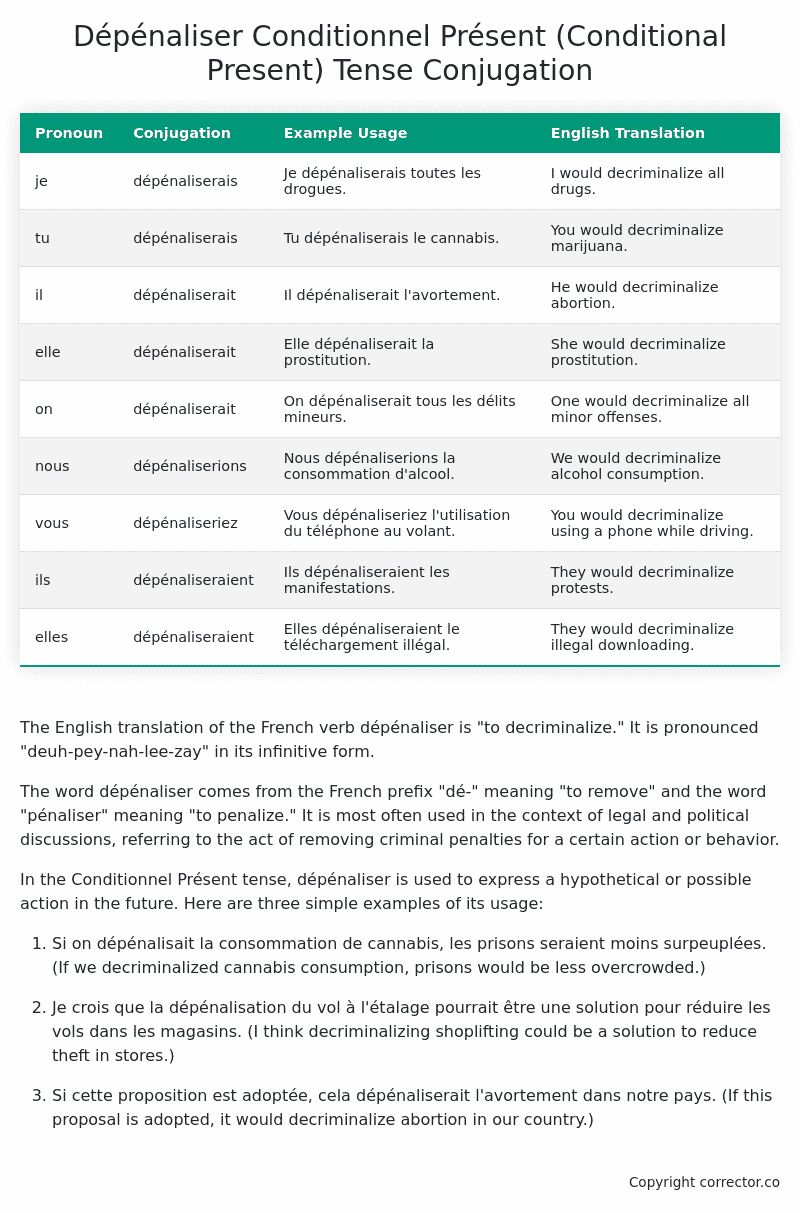Conditionnel Présent (Conditional Present) Tense Conjugation of the French Verb dépénaliser
Introduction to the verb dépénaliser
The English translation of the French verb dépénaliser is “to decriminalize.” It is pronounced “deuh-pey-nah-lee-zay” in its infinitive form.
The word dépénaliser comes from the French prefix “dé-” meaning “to remove” and the word “pénaliser” meaning “to penalize.” It is most often used in the context of legal and political discussions, referring to the act of removing criminal penalties for a certain action or behavior.
In the Conditionnel Présent tense, dépénaliser is used to express a hypothetical or possible action in the future. Here are three simple examples of its usage:
-
Si on dépénalisait la consommation de cannabis, les prisons seraient moins surpeuplées. (If we decriminalized cannabis consumption, prisons would be less overcrowded.)
-
Je crois que la dépénalisation du vol à l’étalage pourrait être une solution pour réduire les vols dans les magasins. (I think decriminalizing shoplifting could be a solution to reduce theft in stores.)
-
Si cette proposition est adoptée, cela dépénaliserait l’avortement dans notre pays. (If this proposal is adopted, it would decriminalize abortion in our country.)
Table of the Conditionnel Présent (Conditional Present) Tense Conjugation of dépénaliser
| Pronoun | Conjugation | Example Usage | English Translation |
|---|---|---|---|
| je | dépénaliserais | Je dépénaliserais toutes les drogues. | I would decriminalize all drugs. |
| tu | dépénaliserais | Tu dépénaliserais le cannabis. | You would decriminalize marijuana. |
| il | dépénaliserait | Il dépénaliserait l’avortement. | He would decriminalize abortion. |
| elle | dépénaliserait | Elle dépénaliserait la prostitution. | She would decriminalize prostitution. |
| on | dépénaliserait | On dépénaliserait tous les délits mineurs. | One would decriminalize all minor offenses. |
| nous | dépénaliserions | Nous dépénaliserions la consommation d’alcool. | We would decriminalize alcohol consumption. |
| vous | dépénaliseriez | Vous dépénaliseriez l’utilisation du téléphone au volant. | You would decriminalize using a phone while driving. |
| ils | dépénaliseraient | Ils dépénaliseraient les manifestations. | They would decriminalize protests. |
| elles | dépénaliseraient | Elles dépénaliseraient le téléchargement illégal. | They would decriminalize illegal downloading. |
Other Conjugations for Dépénaliser.
Le Present (Present Tense) Conjugation of the French Verb dépénaliser
Imparfait (Imperfect) Tense Conjugation of the French Verb dépénaliser
Passé Simple (Simple Past) Tense Conjugation of the French Verb dépénaliser
Passé Composé (Present Perfect) Tense Conjugation of the French Verb dépénaliser
Futur Simple (Simple Future) Tense Conjugation of the French Verb dépénaliser
Futur Proche (Near Future) Tense Conjugation of the French Verb dépénaliser
Plus-que-parfait (Pluperfect) Tense Conjugation of the French Verb dépénaliser
Passé Antérieur (Past Anterior) Tense Conjugation of the French Verb dépénaliser
Futur Antérieur (Future Anterior) Tense Conjugation of the French Verb dépénaliser
Subjonctif Présent (Subjunctive Present) Tense Conjugation of the French Verb dépénaliser
Subjonctif Passé (Subjunctive Past) Tense Conjugation of the French Verb dépénaliser
Subjonctif Imparfait (Subjunctive Imperfect) Tense Conjugation of the French Verb dépénaliser
Conditionnel Présent (Conditional Present) Tense Conjugation of the French Verb dépénaliser (this article)
Conditionnel Passé (Conditional Past) Tense Conjugation of the French Verb dépénaliser
L’impératif Présent (Imperative Present) Tense Conjugation of the French Verb dépénaliser
L’infinitif Présent (Infinitive Present) Tense Conjugation of the French Verb dépénaliser
Struggling with French verbs or the language in general? Why not use our free French Grammar Checker – no registration required!
Get a FREE Download Study Sheet of this Conjugation 🔥
Simply right click the image below, click “save image” and get your free reference for the dépénaliser Conditionnel Présent tense conjugation!

Dépénaliser – About the French Conditionnel Présent (Conditional Present) Tense
Formation
Common Everyday Usage Patterns
Expressing Polite Requests
Expressing Hypothetical Situations
Expressing Doubt or Uncertainty
Interactions with Other Tenses
Present Tense
Past Tense
Future Tense
Conditional Perfect
Summary
Want More?
I hope you enjoyed this article on the verb dépénaliser. Still in a learning mood? Check out another TOTALLY random French verb conjugation!


